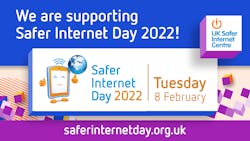UK Safer Internet Day 2022 - 'all fun and games?'

Some of the data collected by this provider is for the purposes of personalization and measuring advertising effectiveness.
Some of the data collected by this provider is for the purposes of personalization and measuring advertising effectiveness.
Some of the data collected by this provider is for the purposes of personalization and measuring advertising effectiveness.


Today is UK Safer Internet Day 2022. Each year in the UK, Safer Internet Day explores a new area or theme that is important to their overall mission to keep young people safe online. Bright World is supporting this year's theme 'all fun and games?' by sharing online safety tips with our students, host families and guardianship parents.
We know that our guardianship students may choose to spend more time online gaming during their school holidays. Whether at home or with their Bright World host family, we want to make sure they are doing so safely and that they are respecting others.
Video games have been around for decades, but the advent of online streaming platforms like YouTube and Twitch has introduced younger children to vast online networks of fellow players.
While playing games online can be a great way to make new friends for older children, it is important that they are taught to think about how much information they are sharing with strangers and how to keep themselves safe.

Most online games are open to players of all different ages. This means that students may be playing with people significantly older or younger than they are. Different players also have different levels of skill at the game.
As games have become more popular with younger players, some people have started to use online gaming to communicate with children. They will try to build up a sense of trust and ask the child to keep their communication with them a secret. This is called grooming.
If a student is contacted by someone who is asking them to do something that makes them feel uncomfortable or to share images with them, they should speak to someone that they can trust, such as a parent, teacher or their Bright World Buddy. The player should then be reported and blocked through the game system.
Students should remember the following important features:


When creating a player name or gamer tag, students should avoid using their real name. They should also avoid creating a profile which shares personal information like their address, phone number, details of their school or their real name. Even a small amount of information can be enough to identify someone offline.
When information is shared online, even if this is in a private message, the original sender no longer has control of it. It can be resent or shared without their knowledge or permission.

Cyberbullying is bullying that happens online. Unlike offline bullying, it can be difficult for children to avoid cyberbullying as it can follow them wherever they go; social media, online gaming and mobile phones make it easier for bullies to contact their victims. Students experiencing cyberbullying should speak with an adult that they can trust, either a teacher, their host family or their Bright World Buddy. Common types of cyberbullying can include:

Online challenges, often associated with the social networking platform, TikTok have taken the online world by storm in recent years. Viral stories, hoaxes, or challenges are designed to look enticing to younger users, who then feel pressured to participate or risk losing the respect of their peers. The challenges vary but often involve individuals harming themselves or others. These challenges can often fun or silly at first but this can quickly escalate.
If a student is being pressured to participate in an online challenge, they should talk to a teacher, their host family of their Bright World Buddy.

read the policy here

find out more about bright world